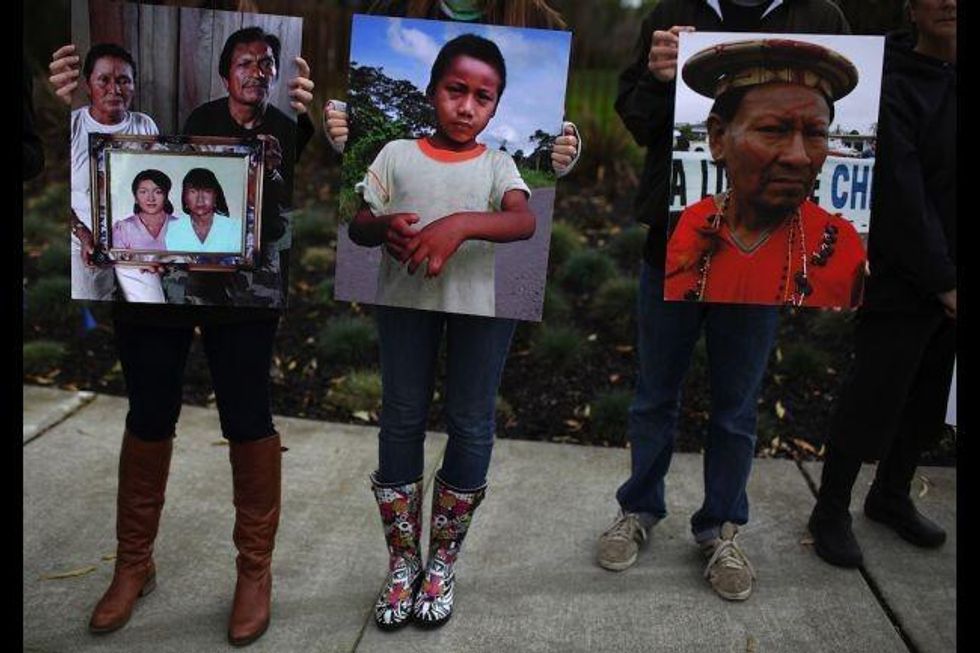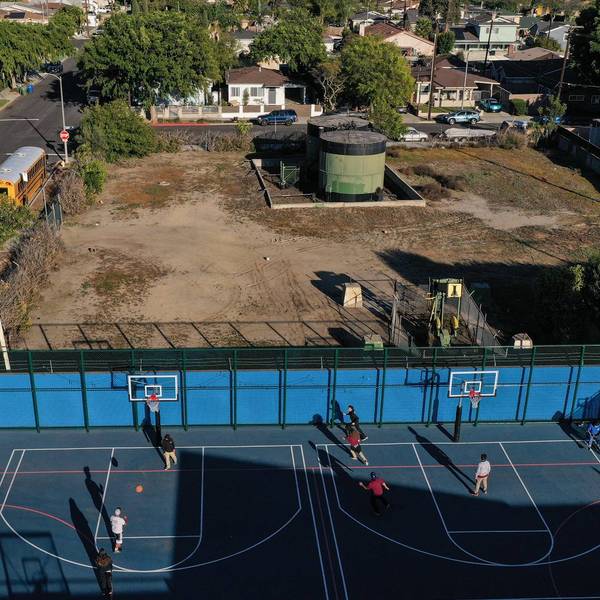Death Threats for Lawyer Suing Over Chevron's Toxic Legacy
"They said to me: 'Think very carefully about what you are doing, because it would be a shame if something happened to you and your family.'"

"People are constantly following us in Ecuador," Juan Pablo Saenz, the Ecuadorian lawyer, told The Guardian. He reportedly said that he has received two death threats over the phone. "They said to me: 'Think very carefully about what you are doing, because it would be a shame if something happened to you and your family.'"
Damages of $18 billion were awarded by the Ecuadorian courts in 2011 after villagers sued over the activities of Texaco, which was acquired by Chevron in 2001, including decades of contamination and pollution of the Lago Agrio region in northeastern Ecuador, which has led to a spike in cancer, reported birth defects and ongoing devastation of the environment. Between 1964 and 1992, the oil giant dumped billions of gallons of toxic waste and spilled millions of gallons of crude oil on over 1,700 square miles of land.
The damages were cut to $9.5 billion by Ecuador's highest court in November. Yet, Chevron has repeatedly refused to pay the fine on unproven charges that the trial was corrupt and has removed most of its assets in Ecuador in an apparent bid to avoid paying. Earlier this month, a US judge ruled in favor of Chevron's claims of corruption, declaring that claimants cannot pursue damages through U.S. courts.
Last year, a Canadian court ruled that indigenous and farmer communities in Ecuador can seek enforcement in Canada of $9.5 billion owed to them.
Saenz, who now has the protection of the Inter-American Human Rights Commission along with the other lawyers, told The Guardian."We will win this fight, however long it takes. We want to show that if poor communities organize, they can get justice," Saenz told The Guardian.
_____________________
An Urgent Message From Our Co-Founder
Dear Common Dreams reader, The U.S. is on a fast track to authoritarianism like nothing I've ever seen. Meanwhile, corporate news outlets are utterly capitulating to Trump, twisting their coverage to avoid drawing his ire while lining up to stuff cash in his pockets. That's why I believe that Common Dreams is doing the best and most consequential reporting that we've ever done. Our small but mighty team is a progressive reporting powerhouse, covering the news every day that the corporate media never will. Our mission has always been simple: To inform. To inspire. And to ignite change for the common good. Now here's the key piece that I want all our readers to understand: None of this would be possible without your financial support. That's not just some fundraising cliche. It's the absolute and literal truth. We don't accept corporate advertising and never will. We don't have a paywall because we don't think people should be blocked from critical news based on their ability to pay. Everything we do is funded by the donations of readers like you. Will you donate now to help power the nonprofit, independent reporting of Common Dreams? Thank you for being a vital member of our community. Together, we can keep independent journalism alive when it’s needed most. - Craig Brown, Co-founder |

"People are constantly following us in Ecuador," Juan Pablo Saenz, the Ecuadorian lawyer, told The Guardian. He reportedly said that he has received two death threats over the phone. "They said to me: 'Think very carefully about what you are doing, because it would be a shame if something happened to you and your family.'"
Damages of $18 billion were awarded by the Ecuadorian courts in 2011 after villagers sued over the activities of Texaco, which was acquired by Chevron in 2001, including decades of contamination and pollution of the Lago Agrio region in northeastern Ecuador, which has led to a spike in cancer, reported birth defects and ongoing devastation of the environment. Between 1964 and 1992, the oil giant dumped billions of gallons of toxic waste and spilled millions of gallons of crude oil on over 1,700 square miles of land.
The damages were cut to $9.5 billion by Ecuador's highest court in November. Yet, Chevron has repeatedly refused to pay the fine on unproven charges that the trial was corrupt and has removed most of its assets in Ecuador in an apparent bid to avoid paying. Earlier this month, a US judge ruled in favor of Chevron's claims of corruption, declaring that claimants cannot pursue damages through U.S. courts.
Last year, a Canadian court ruled that indigenous and farmer communities in Ecuador can seek enforcement in Canada of $9.5 billion owed to them.
Saenz, who now has the protection of the Inter-American Human Rights Commission along with the other lawyers, told The Guardian."We will win this fight, however long it takes. We want to show that if poor communities organize, they can get justice," Saenz told The Guardian.
_____________________

"People are constantly following us in Ecuador," Juan Pablo Saenz, the Ecuadorian lawyer, told The Guardian. He reportedly said that he has received two death threats over the phone. "They said to me: 'Think very carefully about what you are doing, because it would be a shame if something happened to you and your family.'"
Damages of $18 billion were awarded by the Ecuadorian courts in 2011 after villagers sued over the activities of Texaco, which was acquired by Chevron in 2001, including decades of contamination and pollution of the Lago Agrio region in northeastern Ecuador, which has led to a spike in cancer, reported birth defects and ongoing devastation of the environment. Between 1964 and 1992, the oil giant dumped billions of gallons of toxic waste and spilled millions of gallons of crude oil on over 1,700 square miles of land.
The damages were cut to $9.5 billion by Ecuador's highest court in November. Yet, Chevron has repeatedly refused to pay the fine on unproven charges that the trial was corrupt and has removed most of its assets in Ecuador in an apparent bid to avoid paying. Earlier this month, a US judge ruled in favor of Chevron's claims of corruption, declaring that claimants cannot pursue damages through U.S. courts.
Last year, a Canadian court ruled that indigenous and farmer communities in Ecuador can seek enforcement in Canada of $9.5 billion owed to them.
Saenz, who now has the protection of the Inter-American Human Rights Commission along with the other lawyers, told The Guardian."We will win this fight, however long it takes. We want to show that if poor communities organize, they can get justice," Saenz told The Guardian.
_____________________

